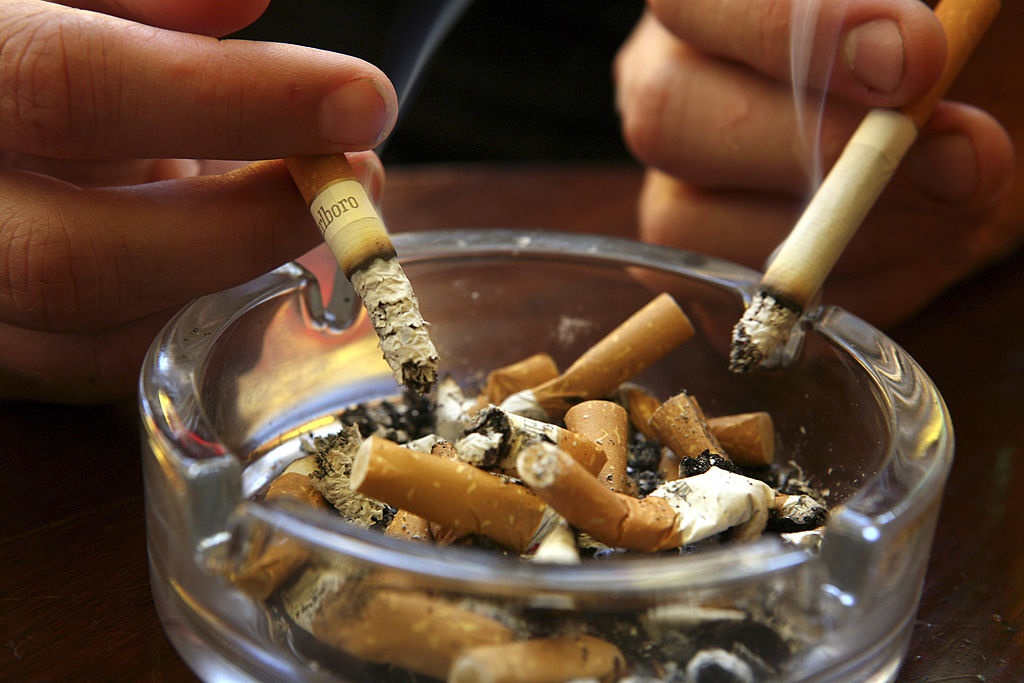
The decision around cigarettes was clearly made collectively, says the writer. (Matt Cardy, Getty Images)
Multimedia · User Galleries · News in Pictures Send us your pictures · Send us your stories

The decision around cigarettes was clearly made collectively, says the writer. (Matt Cardy, Getty Images)
Multimedia · User Galleries · News in Pictures Send us your pictures · Send us your stories

The president and his ministers have to make impossible choices every day during this crisis - not least sacrificing the economy in order to save lives, writes Melanie Verwoerd.
I have always wondered why people believe in conspiracy theories.
Having been bombarded over the past few weeks by armchair experts' versions of "what is ACTUALLY going on", I started to read some literature on the topic.
Scientists who study this phenomenon say that people are more likely to believe in conspiracy theories in times of uncertainty and especially when they feel powerless.
As human beings we don’t like uncertainty or feeling out of control. We like to know that someone has a plan or that we can make our own plans.
Otherwise, life feels just too unpredictable and dangerous.
It is therefore not surprising that there is such a tsunami of conspiracy theories at the moment.
The narrative of conspiracy theories are all the same.
"A big evil person or persons hatching out an evil plan to control us (the masses) so that they can benefit while we suffer."
For example: The Chinese (or the CIA) engineered Covid-19. It was a way for America (or China) to gain globally. Bill Gates, in his quest for world domination, is creating a vaccine that will be tested in Africa and make all African males sterile.
Even though these conspiracy theories are often laughable, they still provide people with a sense of certainty.
"As bad as the plan might be, at least there is a plan," they argue.
And so they give people a (false) sense of control.
Since last week, social media has been rife with theories on why the government - through Nkosazana Dlamini-Zuma (NDZ) - changed its position on the sale of cigarettes.
At the press conference, she explained that the decision was taken after more than 2 000 submissions, many from medical experts.
But, South Africans “knew” better.
“She unilaterally overrode and undermined the president in an attempt to try and make herself president,” thousands of armchair analysts argued.
“She is in the pocket of the illegal cigarette trade” added others, supported by some journalists.
“The President is in big trouble in his own party - the crooks are taking control,” wrote so-called political analysts who should seriously do their homework.
Now, I have sympathy with the fact that people are getting frustrated with this lockdown.
I understand that withdrawal from nicotine and alcohol can be very uncomfortable.
I also understand that - courtesy of the Zuma years - we suspect that there must be a Gupta behind every political bush. However, it is really important that we keep perspective by knowing the facts.
Let’s look at the cigarette issue:
Firstly: the ANC has a long tradition of making decisions through consensus.
The ANC (in- and out of government) debate issues - often heatedly as I’m sure was the case in this instance.
Only once there is a sense of a majority view, is a decision taken. Never does the ANC allow individuals to go rogue and make individual decisions.
So there is absolutely no way that a seasoned member of the movement, like NDZ would find it in her DNA to make such a decision on her own.
The decision around cigarettes was clearly made collectively - she only became the unfortunate messenger.
Secondly: Anyone in- or close to the ANC knows that NDZ has always had a strong aversion to smoking.
About 25 years ago, when smoking was still allowed in meetings, I was present in a meeting of very senior ANC people.
I recall Mac Maharaj, Trevor Manuel and other Cabinet ministers being there.
Many were smoking. Suddenly the door opened and NDZ appeared.
She stopped and silently looked at everyone in the smoke-filled room.
No one said a word, but the smokers all quietly killed their cigarettes, while looking at each other like naughty children who were caught by their mother.
She then entered the room.
Unsurprisingly it was whilst Minister of Health, that she banned cigarette sponsorship for sport and made separate smoking areas a legal requirement.
To therefore suggest that she, as a medical doctor, would take any decision for kickbacks from the illegal tobacco trade seems ludicrous.
Of course, underpinning this whole conspiracy theory is the suggestion that NDZ is being used by the anti-Ramaphosa forces as a platform to start mobilising for the next elective conference.
Apart from the fact that there is no evidence to suggest that she is interested in running again - in fact the contrary - there is absolutely no chance that anyone would be stupid enough to think that they could take on the President at this time.
His approval ratings among party members are sky high.
In addition, according to all accounts he and and NDZ have - and continue - to work closely together. On a personal level they get along very well.
In any case if they weren’t - all ministers serve at the pleasure of the President.
So if she would have been stupid enough to have “gone rogue” as all the conspiracy theorists suggest, the President could easily fire her or move her out of her key position.
These are only some of the numerous conspiracy theories out there.
There are many more - all suggesting that the President, government and ministers are either insensitive to the needs of the people, are incompetent, are dictators-in-waiting or have some ulterior motive with the regulations during lockdown.
So let me leave you with one very scary statistic.
According to Prof Karim, there are about 2.5 million HIV positive people in South Africa who are not on anti-retroviral therapies. Experts suggest that it is reasonable to accept that about 50% of them would have very low CD-4 counts which, in turn, would make them severely immune compromised.
Even though there is no international experience, they expect the mortality rate to be extremely high should Covid-19 hit this demographic.
That could mean hundreds of thousands of people dying if the disease spread in the disadvantaged areas.
So logic dictates to me that this is the more likely explanation for what motivates the government’s decisions - not some sinister plan or plot.
The president and his ministers have to make impossible choices every day during this crisis - not least sacrificing the economy in order to save lives.
I don’t know if all the decisions they are making are right.
But: I sure am glad, that I don’t have to make them.
- Melanie Verwoerd is a former ANC MP and South African Ambassador to Ireland